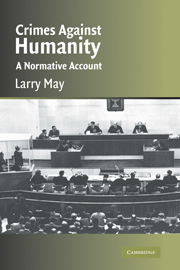Book contents
- Frontmatter
- Contents
- Acknowledgments
- A UNIVERSAL NORMS AND MORAL MINIMALISM
- B PRINCIPLES OF INTERNATIONAL CRIMINAL LAW
- C PROSECUTING INTERNATIONAL CRIMES
- D DEFENSES AND ALTERNATIVES
- 10 Superior Orders, Duress, and Moral Perception
- 11 The International Rule of Law
- 12 Victims and Convictions
- 13 Reconciliation and Amnesty Programs
- Conclusions
- Notes
- Bibliography
- Index
12 - Victims and Convictions
Published online by Cambridge University Press: 23 November 2009
- Frontmatter
- Contents
- Acknowledgments
- A UNIVERSAL NORMS AND MORAL MINIMALISM
- B PRINCIPLES OF INTERNATIONAL CRIMINAL LAW
- C PROSECUTING INTERNATIONAL CRIMES
- D DEFENSES AND ALTERNATIVES
- 10 Superior Orders, Duress, and Moral Perception
- 11 The International Rule of Law
- 12 Victims and Convictions
- 13 Reconciliation and Amnesty Programs
- Conclusions
- Notes
- Bibliography
- Index
Summary
Victims wish for some form of closure, and sometimes also for retribution against those who have harmed them. Victims and their family members also often make a very distinct demand for what can be called “final justice.” Especially when the perpetrators of crimes are in hiding, victims often have a sense of righteous indignation that the perpetrators are free and unharmed, while the victims may be dead or seriously injured and their families thrown into a state of emotional upheaval. The victims and their families will call out for justice, and this will most readily lead them to demand prosecution in criminal trials, where the perpetrators are confronted by their deeds, publicly proclaimed to be guilty by a representative (group or individual) of the society, and punished appropriately by significant loss of liberty or life for the harms they have caused. International criminal law is motivated by such concerns, as it should be.
Advocates for truth commissions and amnesty programs in international law face some of the same problems as Anglo-American criminal defense lawyers. First, they face the strongly voiced objection that they impede the goal of retribution, not allowing the victims to get their due. Second, there is a concern that lawyers become complicit in the destruction of the “rule of law,” since people who have done wrong will escape punishment, thereby achieving the kind of impunity that marks non-rule-governed societies. In this chapter, I offer reasons to reject both of these objections.
- Type
- Chapter
- Information
- Crimes against HumanityA Normative Account, pp. 220 - 234Publisher: Cambridge University PressPrint publication year: 2004
- 1
- Cited by

